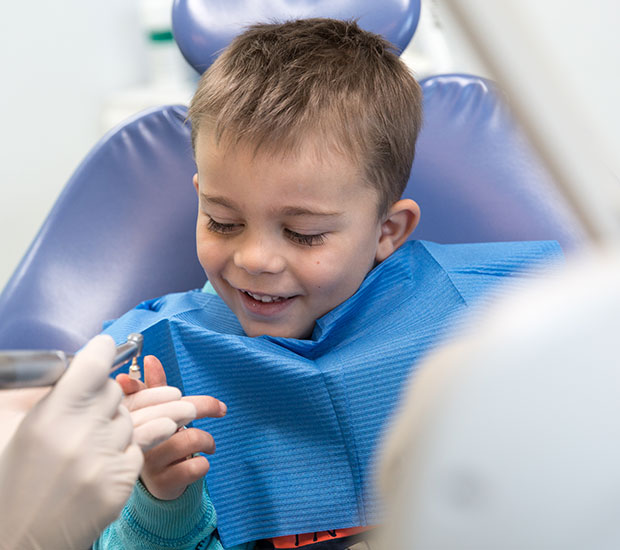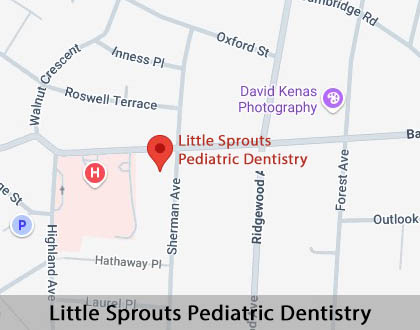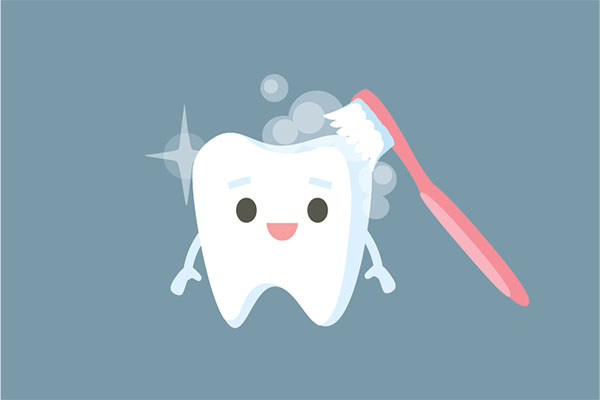Cavity Treatment Options Glen Ridge, NJ
Children can develop cavities due to poor oral hygiene, diet, or a genetic predisposition. Fortunately, there are various cavity treatment options to remove decay and save teeth. Cavity treatment can resolve the problem and improve your child's oral health.
Little Sprouts Pediatric Dentistry offers cavity treatment options in Glen Ridge and the surrounding area. If your child has a cavity, our team can help restore and protect their teeth. Call us at (973) 221-2919 for more information about our services or schedule an appointment.
Pediatric Treatment Options for Cavities
Cavities, also known as dental caries or tooth decay, occur due to a combination of factors including oral hygiene, diet, bacterial composition of the mouth and genetic predisposition. There is a wide range of treatment options to tackle cavities based on their size and location. Even baby teeth can get cavities that need treatment in order to avoid pain, maintain chewing ability and minimize future oral health issues.
Diagnosing a Cavity
Cavities are one of the most common dental problems in children. They are a softened or damaged area in a tooth that occurs due to bacterial causing tooth decay. Parents are often surprised to learn that their child has a cavity. This is due to the fact that cavities often do not cause symptoms until they are very big and they are not always visible to the untrained eye. The best way to determine whether a child has a cavity is through a regular dental check-up and when needed, x-rays.
We will examine the teeth for any soft spots or visual signs of a cavity during the check-up appointment. Sometimes, we will take X-rays to check areas of the mouth that the visual examination cannot reach. The sooner the cavities or soft spots, also known as pre-cavities, are detected, the more treatment options are available to us. Cavities that are allowed to grow can cause greater dental problems and complications in the future.
“The best way to determine whether a child has a cavity is through a regular dental check-up and when needed, x-rays.”
Cavity Treatment Options
Various cavity treatment options are available depending on the patient’s needs and ability to tolerate treatment. In the early stages, the cavity might be reversible or stoppable with good home care and fluoride treatments. In some cases, we can apply a medication in the office to “pause” the cavity. If the lesion is past that point, treatment options include:
- Fillings (also known as composite restorations)
This is the most common treatment option. It involves removing only the affected part of the tooth and replacing it with a tooth-colored composite filling.
- Crowns
In cases when the cavity is too big for a filling, the tooth can be restored by placing a crown over it. Sometimes, if the cavity is deep, the crown is preceded by a nerve treatment known as a pulpotomy. Pediatric crowns are different from adult crowns because they are pre-made and can be completed in one visit.
- Extractions
Our least favorite type of treatment, extraction is a last resort when a tooth cannot be fixed or is infected. In case of a tooth needing an extraction well before it is ready to fall out, a space maintainer may be recommended to hold the space open for the permanent tooth to come into.
Drs. Baxi and Khan both believe in conservative dentistry. They will always offer options that range from least to most aggressive and discuss the pros and cons with you so you can make an informed decision that is in your child’s best interest. In many cases, baby teeth do not need to be numbed for dental work. Additionally, we offer nitrous oxide, or laughing gas, to help with your child’s anxiety during dental procedures. Your child’s safety and comfort are important to us, so our team will work with you to find the best path forward to meet your little one’s dental needs.
“In the early stages, the cavity might be reversible.”
Silver Diamine Fluoride (SDF)
Silver Diamine Fluoride (SDF) is a safe, non-invasive, topical treatment we use to slow down or arrest cavities. When a cavity is caught early, it is still reversible. Silver Diamine acts as an antibacterial to deactivate the cavity-causing bacteria on the surface of the affected tooth while Fluoride helps the damaged enamel to remineralize or re-harden. It can be used to avoid or delay the need for cavity treatments such as fillings or extractions. It is ideal for young, apprehensive children or patients with special needs who may not be able to tolerate traditional dental procedures yet. SDF is applied by brush or floss onto the affected area - it is fast, painless, and can help to buy time until the child is ready to have more definitive treatment to address the cavities. While SDF may darken areas of application, it’s an effective way to manage cavities and maintain oral health, particularly when more involved treatment isn’t the right option just yet. SDF does not permanently cure or heal cavities, so good oral hygiene and a healthy diet are still crucial to control the progression of caries. You can learn more about SDF in the American Academy of Pediatric Dentistry's Guidelines at https://www.aapd.org/media/policies_guidelines/g_sdf.pdf. Treatment will prevent the problem from worsening or spreading to other teeth. Once the cavity receives treatment, a child’s tooth pain and discomfort will disappear.
Dental Bonding and Crowns
Dental bonding can repair minor cracks and chips. During this procedure, the dentist uses a composite resin to cover up damaged spots. Bonding protects teeth against further cracks or decay. But if the damage remains severe, bonding may not be the right choice. Talk to your dentist for more information about dental bonding.
If a tooth has severe decay, the dentist may suggest a crown. Decayed teeth stay weak and prone to cracks. A crown protects the tooth from further damage. Modern crowns can be customized to fit even a young child's mouth. These crowns, often known as mini crowns or baby crowns, are even suitable for children who do not yet have their permanent teeth.
“Bonding protects teeth against further cracks or decay.”
What To Do About a Suspected Cavity
Parents who suspect that their child has a cavity should schedule a dental appointment as soon as possible. Please let our team know about any symptoms that your child has noticed or complained about.
Children may feel nervous or scared before a visit to the dentist for a cavity. We have found that it is best to reassure your child and keeping the explanations child-friendly. Instead of using scary words like “drill” and “needle”, you might hear us say “water toothbrush” and “sleepy juice”. Some kids’ shows also have dentist episodes that are helpful in preparing your little one.
“Parents who suspect that their child has a cavity should schedule a dental appointment as soon as possible.”
Check out what others are saying about our dental services on Yelp: Cavity Treatment Options in Glen Ridge, NJ
Pain and Other Risks of Untreated Cavities
Children who are experiencing dental pain should be evaluated as soon as possible. Parents should contact our office and schedule an appointment to diagnose the problem and develop an appropriate treatment plan. Delaying treatment can put a child’s mouth and overall health at risk.
Tooth decay can spread quickly and dental problems can worsen without any warning signs. The sooner a cavity is treated, the better. Untreated cavities can grow and lead to an infection if they reach the nerve or pulp of the tooth, called an abscess. Timely treatment will prevent the problem from spreading past the tooth into the bone or other teeth.
“Tooth decay can spread quickly and dental problems can worsen without any warning signs. ”
Questions Answered on This Page
Q. What are the cavity treatment options?
Q. How are broken or decayed teeth repaired?
Q. What should parents do about a suspected cavity?
Q. What happens if I put off getting the cavity filled?
Q. What should parents do at home while waiting for their child’s appointment?
People Also Ask
Q. How can I determine if my child needs orthodontic care?
Home Treatment Options
In some cases, a child must wait a few days to receive cavity treatment. As a child waits for their appointment, parents should ensure that their child continues brushing and flossing. If your little one is having pain when chewing, offer soft, room-temperature foods and drinks.
Our team can also recommend some over-the-counter medications to relieve discomfort and tooth pain. If an infection is suspected, the doctor may prescribe an antibiotic to help contain the abscess.
“As a child waits for their appointment, parents should ensure that their child continues brushing and flossing. I”
Frequently Asked Questions
Q. What is a cavity?
A. Cavities are decayed areas on the surface of the teeth. They usually develop due to bacteria in your mouth. These bacteria feed on sugar, then produce an acid that damages tooth enamel. Without treatment, the tooth might become severely decayed or infected. Prompt cavity treatment helps avoid these outcomes.
Q. How are cavities diagnosed?
A. Larger cavities might be visible to the naked eye. Our team may spot a cavity during a visual exam or cleaning. A cavity might also turn up on an X-ray or imaging test.
Q. How are cavities treated?
A. If a child has a cavity, they should receive treatment quickly. Early cavity treatment prevents the problem from worsening. Fillings can repair most small cavities. If the tooth has severe decay, it may need further treatment. Our team will determine the best treatment plan for each patient’s unique needs.
Q. How can I prevent cavities?
A. Good oral hygiene helps to protect teeth against cavities. We recommend that parents help with or supervise their children as they brush twice a day and floss daily. Diet also plays an important role in the formation of cavities. All carbohydrates - sweet or savory - can feed the cavity-making bacteria so it is important that children have a balanced diet and lots of water.
Q. Can cavities be fixed at home?
A. Once a cavity has formed, at-home treatments will not get rid of it. Professional dental care is the only way to restore and protect a tooth from decay fully. Parents should report their child’s new or worsening tooth pain to our team right away.
Quality Pediatric Dental Services Can Transform Smiles
By visiting us as soon as possible, our team can help get your child the professional treatment they need.
Definition of Pediatric Dental Terminology
Call Us Today
Cavities are a common but treatable childhood dental concern. Our team at call Little Sprouts Pediatric Dentistry can treat tooth decay and prevent future dental problems. Call us at 973-221-2919 to learn more about our services or schedule an appointment.
If you live in the Glen Ridge area, call 973-221-2919 for an appointment in our Glen Ridge office.
Helpful Related Links
- American Dental Association (ADA). Glossary of Dental Terms. 2025
About our business and website security
- Little Sprouts Pediatric Dentistry was established in 2025.
- We accept the following payment methods: American Express, Check, Discover, MasterCard, and Visa
- We serve patients from the following counties: Essex County
- We serve patients from the following cities: Glen Ridge, Montclair, Bloomfield, Nutley, and Verona
- Norton Safe Web. View Details
- Trend Micro Site Safety Center. View Details
Back to top of Cavity Treatment Options







